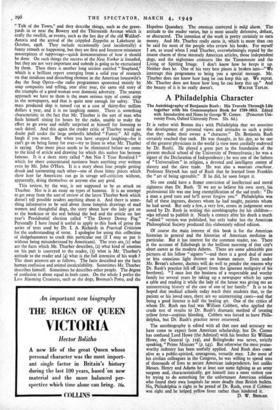A Philadelphia Character
The Autobiography of Benjamin Rush : His Travels Through Life together with his Commonplace Book for 1789-1813. Edited with Introduction and Notes by George W. Corner. (Princeton Uni- versity Press, Oxford University Press. 32s. 6d.) IT is rather with Boston than with Philadelphia that we associate the development of personal views and attitudes to such a point that they make their owner a " character." Dr. Benjamin Rush certainly reached that rank. He was thought, in his day, to be one of the greatest physicians in the world (a view most cordially endorsed by Dr. Rush). He played a great part in the foundation of the present medical school of the University of Pennsylvania ; he was a signer of the Declaration of Independence ; he was one of the fathers of " Universalism " in religion, a devoted and intelligent enemy of slavery and the slave trade. He was also a mauvais coucheur. Professor Shryock has said of Rush that he learned from Franklin the " art of being agreeable." If he did, he soon forgot it.
No one could have a firmer conviction of intellectual and moral rightness than Dr. Rush. 'If we are to believe his own story, his professional life was one long exemplification of the sad truth : "Do a man a good turn and he'll never forgive you." Philadelphia was full of these ingrates, doctors whom he had taught, patients whom he had saved. But only a few, a very few, errors in judgement were noted by Dr. Rush in writing this autobiography for his children— who refused to publish it. Nearly a century after his death a much " edited " version was published, but only today has the American Philosophical Society produced this elaborately edited edition.
Of course the main interest of this book is for the American historian in general and the historian of American medicine in particular. But it has interest for the common reader, too. There is the account of Edinburgh in the brilliant morning of that city's short career as the modern Athens. There are some admirable pen pictures of his fellow " signers "—and there is a good deal of more or less conscious light thrown on human nature. Even under Mr. Bevan's scheme, doctors will do well to ponder the reasons why Dr. Rush's practice fell off (apart from the ignorant malignity of his brethren). " I once lost the business of a respectable and worthy family for several years by taking up a newspaper which lay upon a table and reading it while the lady of the house was giving me an uninteresting history of the case of one of her family." It is to be hoped that medical schools today teach their students that, to the patient or his loved ones, there are no uninteresting cases—and that being a good listener is half the healing art. One of the critics of whom Dr. Rush ran foul was William Cobbett, who applied the crude test of results to Dr. Rush's dramatic method of treating yellow fever—copious bleeding. Cobbett was forced to leave Phila- delphia, but Dr. Rush's practice never recovered.
The autobiography is edited with all that care and accuracy we have come to expect from American scholarship, but Dr. Corner has confused Lord Howe (the Admiral) with his brother Sir William Howe, the General (p. 119), and Bolingbroke was never, strictly speaking, " Prime Minister " (p. 143). But otherwise the most praise- worthy industry has been usefully applied. And Rush does come alive as a public-spirited, courageous, versatile man. Like most of his civilian colleagues in the Congress, he was willing to spend tens of thousands of lives to secure American independence, but unlike Messrs. Henry and Adams he at least saw some fighting as an army surgeon and, characteristically, got himself into a most violent row by trying to do something for the unfortunate American soldiers who found their own hospitals far more deadly than British bullets. No, Philadelphia is right to be proud of Dr. Rush, even if Cobbett was right and he helped yellow fever rather than hindered it.
D. W. BROGAN.






































 Previous page
Previous page